|
Timeline
Overview of the early Mount Rainier Naturalist Program: 1913-41
Compiled by Bob McIntyre, Jr.
March 2001
July 1, 1913
John B. Flett, biology and geology teacher for approx. 20 years in
Tacoma, hired as a permanent ranger. He was stationed at Longmire.
Duties included traffic control, campground patrol, and distribution of
information and literature.
1918
Flett recognized by National Park Service Director Stephen T. Mather for
his interpretive value to the park.
1920
Information office and interpretive responsibility moved to Nisqually
Entrance. Plans made for visitor information services and exhibits at
Paradise.
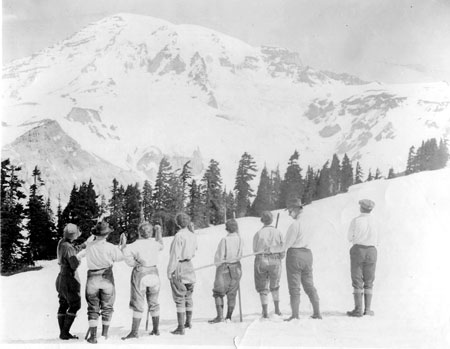
Guide Alma Wagen - Nisqually trip, 1920.
(Photo by Frank A. Jacobs, Official Photographer, Rainier National
Park Co., Longmire Springs, Wash.)
1921
Charles Landes, science teacher in Seattle, hired as a seasonal ranger
and nature guide. He was instructed to set up an interpretive program at
Paradise. He guided nature walks, created a cut flower display, and gave
nightly lectures with lantern slides. The projector was borrowed from
the park's concessionaire, the Rainier National Park Co.
November 9, 1921
Flett left his Mount Rainier position.
1922
Landes set up an interpretive information service at Longmire. Evening
slide shows were given at the public campground. Paradise interpretation
site moved to the new Rainier National Park Co. Guide House (completed
in 1921). Lectures were given in the basement. Park Superintendent
mentioned the popularity of the new nature guide service in his yearly
report, and requested purchase of program equipment.
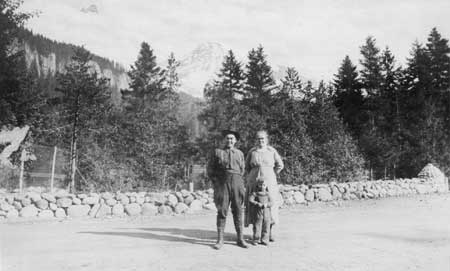
Mr. & Mrs. Green - Caretakers, Longmire 1923
(Courtesy Mount Rainier National Park)
July 16, 1923
Floyd W. Schmoe helped produce
the first (Vol.I No.1) Nature Notes at Mount Rainier. Yosemite's first
issue was 1922. Yellowstone's started around the same time as Mount
Rainier's.
1923
Landes, now considered to be a seasonal park naturalist, reported that
15,000 people had been served at Paradise in 1923. He recommended that
museum displays be installed the community buildings planned for
Longmire and Paradise. Park Superintendent reported that the
interpretive program had gained enthusiastic public support and
recommended it be continued on a permanent basis.
1924
Paradise nature guide program expanded to two men, Landes and another.
The Superintendent requested 2 full time interpreters.
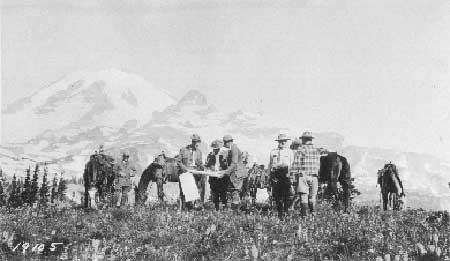
Around the mountain trip 1924.
(Courtesy Mount Rainier National Park)
November 1, 1924
Schmoe became permanent park naturalist. Plans made to expand the
interpretation program.
1925
Paradise Naturalists set up exhibits in Ranger Station. Schmoe and three
assistants (including Landes) helped 75,000 people at Longmire and
Paradise combined. Park Superintendent requested funding of a museum.
1927
By 1927, Schmoe began planning and preparing exhibits for a museum at
Longmire. Preparation made to move Paradise interpretation program and
exhibits to new Community Building. Part time interpretation at White
River Campground began and recession of Emmons Glacier studied.
August 31, 1928
Schmoe resigned. C. Frank
Brockman, information ranger, later becomes Park Naturalist.
1928-29
Brockman converted old Administration Building "Superintendent's
Office") to a museum (this building continues to serve as the Longmire
museum). Landes created plant/rock collections for both Longmire and
Paradise display.

Frank Brockman talking to visitors at
Longmire Museum about the cougar on display, 1941.
(Courtesy Mount Rainier National Park)
1929
The Paradise naturalists and their exhibits moved from the Paradise
Ranger Station into new Paradise Community Building.
1930
Elizabeth Morse of Berkeley, CA collected park fungi. Brockman planned
and prepared exhibits for the new Sunrise area development. Landes laid
out wild flower garden in front of blockhouse.
1931
A cooperative agreement among the U.S. Geological Survey, the city of
Tacoma, and the National Park Service led to studies of glacier
recession on the mountain. The Longmire museum was repaired and
upgraded. Blockhouse at Sunrise housed naturalists. Indoor programs were
given in a storage building behind the blockhouse. Indian exhibits were
developed, and geologic relief models were made for several interpretive
areas.
1932
Park naturalists were given 15 minutes of time on radio station KVI each
week. Brockman planned a new museum for Longmire, as well as museums for
Paradise and Sunrise.
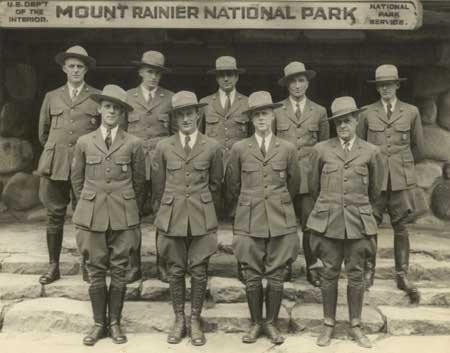
1932 staff.
(Courtesy Mount Rainier National Park)
1933
Park Superintendent requested that a museum be built at Longmire as a
Public Works Project. Brockman and seven seasonal naturalists gave
programs in the park and at two state fairs. The Rainier National Park
Co. protested that NPS nature guide service took business from company
guides. The NPS program was reduced for about two weeks, then begun
again because of public protest.
1934
The Rainier National Park Co. guide service joined with park naturalists
on radio broadcasts.
1935
Paradise Museum plan and request for funding forwarded.
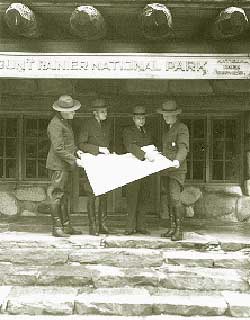
Bill Butler, Oscar Carlson, Oscar
Sedergren
and Superintendent O.A. Tomlinson, 1941.
(Courtesy Mount Rainier National Park)
|
1937
Mount Rainier National Park Encyclopedia of Information, compiled over a
9-year period by the Naturalist Department, became primary reference for
answering natural science and human history questions.
1939
First interpretive programs given at Ohanapecosh campground. A museum
built at Ohanapecosh by combining two CCC structures. Museum
construction begun next to the Paradise Lodge (a Federal Public Works
Project). Mount Rainier Natural History Association began. Nature Notes
ended with the December issue.
1940
Trail side exhibits were developed and constructed. A wildflower garden
was created at Ohanapecosh. A Grove of the Patriarchs nature trail was
constructed.
March 27, 1941
Brockman transferred to Yosemite.
April 8, 1941
Howard R. Stagner became Park Naturalist.
| 
